Main Et al. Takeaways:
- Et al. comes from the Latin word meaning and others.
- It’s used in scholarly texts and other source-inclusive writing like footnotes bibliographic lists, and on the covers of books that have multiple authors or contributors.
- The period comes after the al because it’s an abbreviation of alia.
- Et al. is for lists of people while etc. is for lists of things.
- Et al. can also stand for et alibi. It means and elsewhere and is used to reference a subject that appears in other places in a text.
Et al. is an abbreviation for a Latin phrase that means and others. When an academic paper has more than one author, we use it after the principle author’s name to substitute multiple names in footnotes and bibliographies. If you’re unsure on how to use et al., here’s a detailed guide for you.
What is the Meaning of Et Al.?
The term is an abbreviation of the Latin phrase et alia. This is a gender-neutral term that means and others. It can also stand for et alii, which is the masculine version usually used for all male-authors. On the other hand, et aliae is the feminine version usually used for all-female authors. Et al. can also stand for et alibi, which means and elsewhere. In this context, it usually references a subject that appears in other places in a text. Think of an alibi for a crime and it’s connection with a place: it confirms you were somewhere than the crime scene when the crime took place.
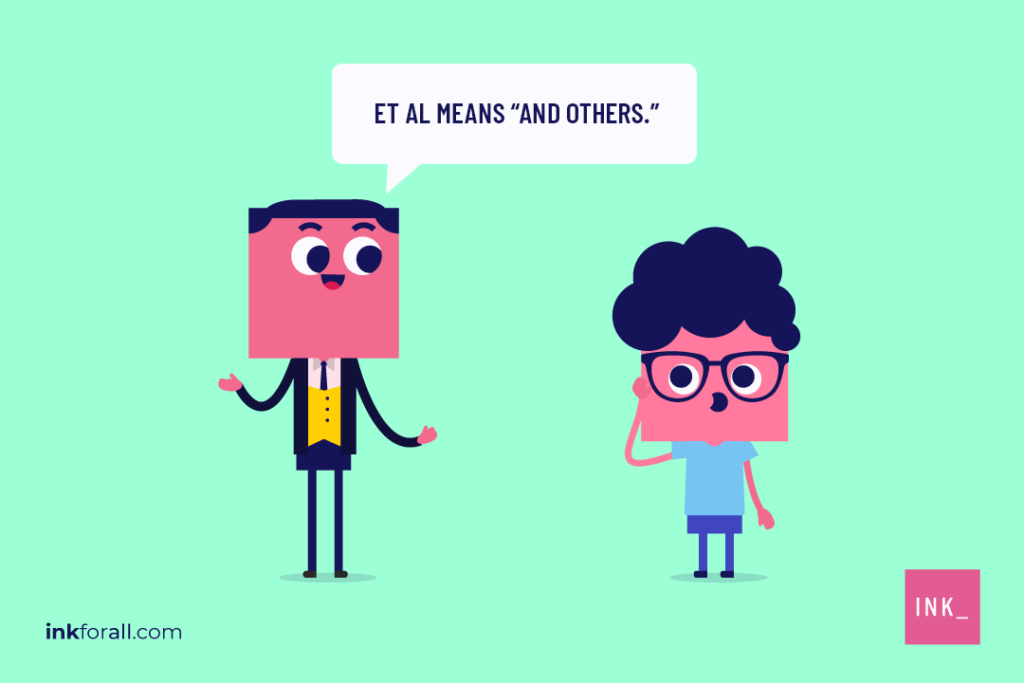

While et al. is one of many Latin phrases the English language has borrowed, it isn’t as common as others. In fact, it appears almost exclusively in very formal writing, like scholarly text and academic publications.
How Do You Read Et Al.?
Et al. is the abbreviated way to write the term. However, when you say it out loud, you should say the full term et alia or et alii. Another option is to say the English translation and others just like you might say for example when reading e.g., out loud.
Similarly, you write etc. but when read it out loud, you say the full term et cetera.
How Do You Use Et Al.?
Use this Latin phrase to show that there are additional contributors or collaborators that don’t appear on a list. First, list the name of the principle author. Then, add a space. Next, add et al. Don’t forget to add a period after al.


How Do You Write Et Al. in APA
What’s more, the rules of usage can vary depending on the stylebook you follow. In particular, the APA Stylebook has several specific rules when it comes to et al.
- Don’t italicize it.
- You don’t use it for references with one or two authors.
- If a reference has three, four, or five authors, the first citation should not use et al. All subsequent citations should includeet al.
- References with six or more authors should include one name, followed by et al.
- If et al. creates ambiguity, names may be written out in all citations. This may include citations with overlapping authors.
Can You Use Et Al. in a Greeting?
Have you ever sent an email on behalf of your team or organization and got an email response with this kind of greeting: “Dear John et al.“? As discussed in this post, et al. means and others in English. Because of that, some people tend to add et al. at the end of their email greeting to address not just the one who sent the email but the group of people or organization he/she’s representing. Simply put, that greeting meant “Dear John and others“.
To answer the question, yes you can use et al. in your email greeting. But the real question is: Is it proper to use et al. in a greeting? The quick answer is no. Here are three reasons why you should avoid the use of et al. in your email greeting:
1. We use et al. to imply that there are other contributors to a written work, like a book or academic paper, that are not shown in the list of authors and contributors.
2. Et al. is commonly used in bibliographies, particularly footnotes and citations.
3. Et al. is a very formal term and not all people know what it means. Using it when greeting a group of people, whether in email or other forms of communication, can lead to confusion.
Why Use Et Al.?
First, it shortens or simplifies references such as bibliographies, in-text citations, and footnotes that include two or more contributors or authors.
Secondly, this phrase can also be a useful tool for keeping book covers uncluttered. This is especially the case for books like multi-author collections or anthologies.
How to Punctuate Et Al.
1. When to Use a Period
When using et al., there’s an easy rule for remembering where the period goes. Since the al is an abbreviation of alia, place the period after it to indicate a shortened word.


On the other hand, if the phrase sits at the end of a sentence, it requires a single period.
2. When to Use a Comma
Do not put a comma between the last surname in the list and et al.
However, a comma may follow Et al. where you would need a comma to maintain correct grammar. One example is in situations where the phrase and others would require a comma after it:
Another example is with dates:
Et Al. vs. Etc.
It’s true that et al. and etc. both come from Latin. They are also both abbreviations. And, we use them both to stand in for items not explicitly included in a list.
However, these terms aren’t interchangeable.
On one hand, et al. refers to people and is short for et alia. It means and others.
On the other hand, etc. refers to concepts or things and is short for et cetera. It means and so forth.
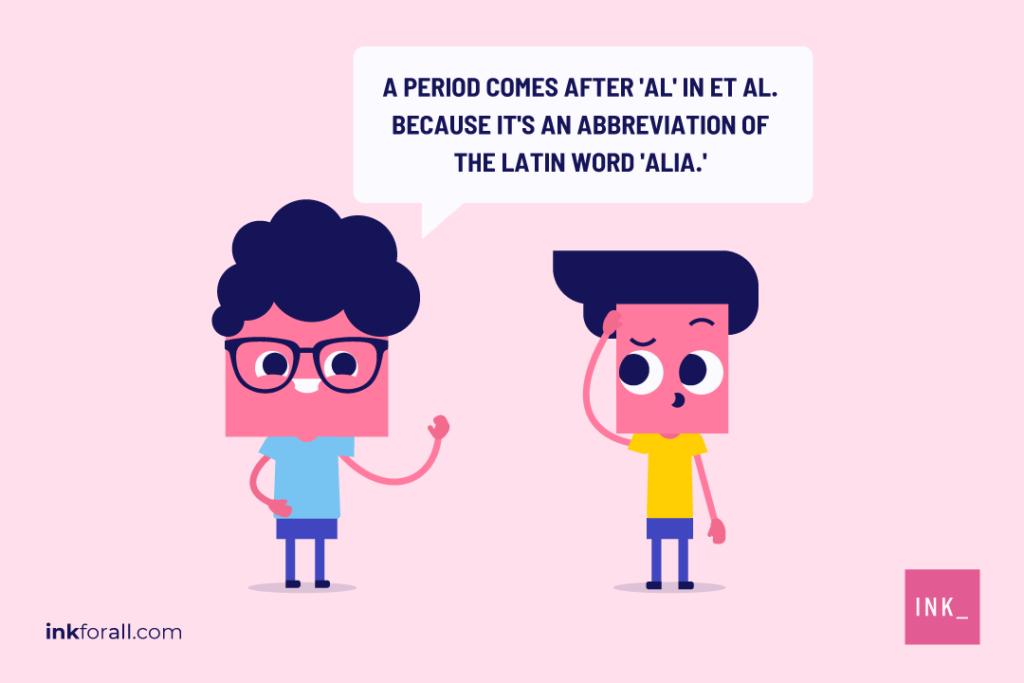

What’s more, et al. usually appears in formal research-driven or scholarly texts. Conversely, etc. appears in most types of writing.
Yes, There Are Two of Them—The Other Et Al.
In Latin, et alibi means and elsewhere.
You can use it at the end of a list of locations. In this case, it functions as a stand-in for places rather than people or things.
However, we don’t mean geographical or physical places like Canada, or Las Vegas. When considering the other et al., the meaning in most cases is slightly different. In this way, we usually use it to refer to page numbers in book or specific lines in a text.
For example, Et alibi is used to reference specific occurrences of subjects or words in a body of text such as The Bible or Dune.
In other words, we use to let the reader know exactly where to go in a text to find the information we just referenced
Unless you’re a student, an academic, or a researcher, you may never have to use et al. in anything you write.
Quick Et Al. Quiz
Et Al. Question #1
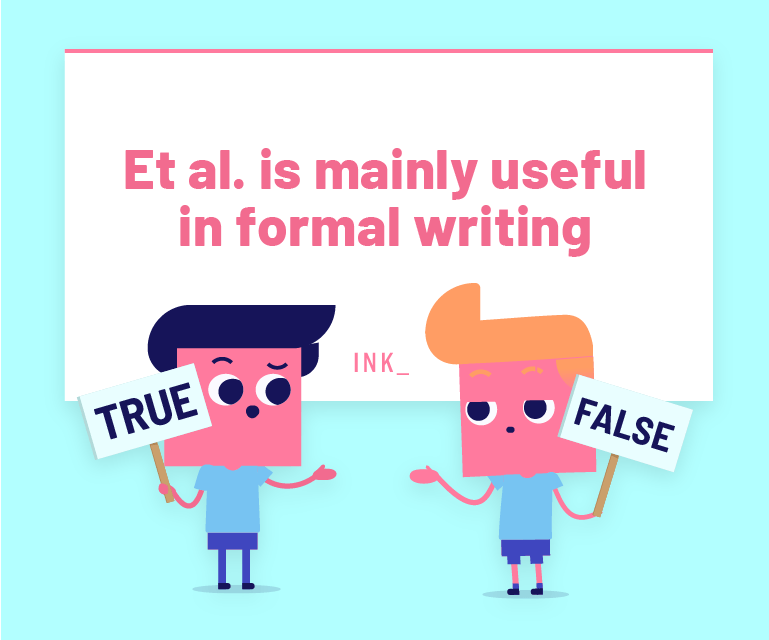

The answer is TRUE. Et al. is used in academic citations when referring to a source with multiple authors.
Et Al. Question #2


The answer is B. Et alii and et aliae are gender-sensitive variants of et alia, which means "and others." Meanwhile, et alibi means "and elsewhere."
Et Al. Question #3
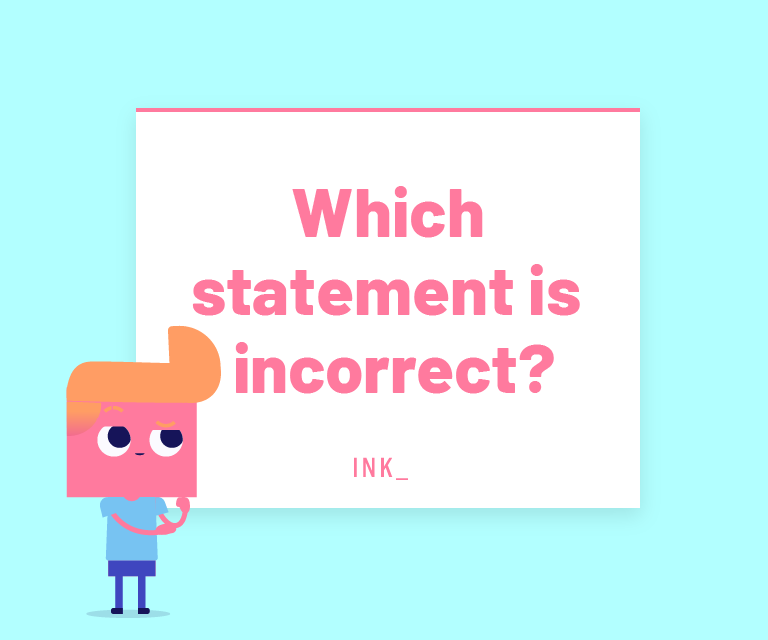

The answer is A. Et al. has a Latin origin.
Et Al. Question #4
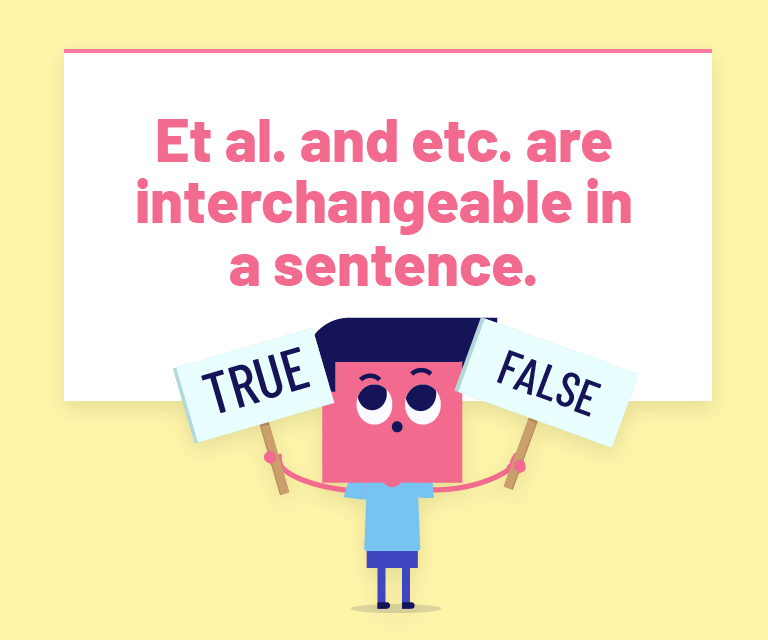

The answer is FALSE. Unlike Et al., which refers to people, etc. refers to concepts or things.

Comments (0)
Most Recent